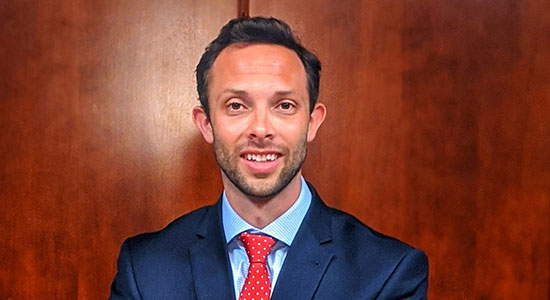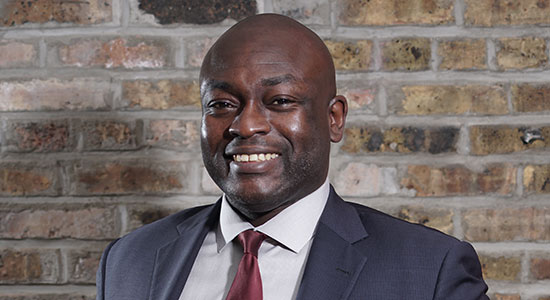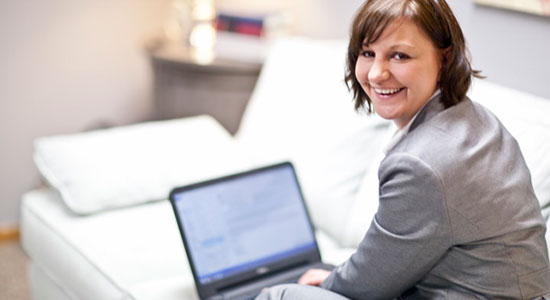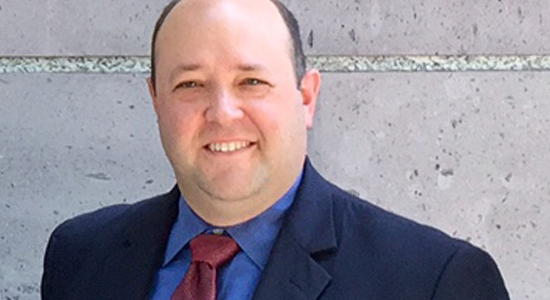
“I cannot physically have clients come in even if I want to right now,” says Thomas Burton, a solo practitioner in Eau Claire. “It is okay though, I am fully set up to operate virtually, and I have switched to phone or video consultations.”
April 1, 2020 – Gov. Tony Evers issued a “Safe at Home” order effective one week ago. Legal services are exempt from the order – lawyers may leave their homes to provide legal services, and clients may leave their homes to receive legal services.
But law practice is anything but business as usual. For one, lawyers and law firms must still practice social distancing by using technology to avoid meeting in person “to the greatest extent possible,” including virtual meetings, teleconferences, and remote work.
Thomas Burton, a solo practitioner in Eau Claire, said the bank building in which his office is located is closed, but he’s using the bank’s drive-up window to sign wills.
“I cannot physically have clients come in even if I want to right now,” Burton said. “It is okay though, I am fully set up to operate virtually, and I have switched to phone or video consultations. The client can stay in the car.”
Burton said he and another person can serve as witnesses and the client can sign the will from a distance of at least six feet, fully protected from the elements.
“I plan to use this for situations where the client feels they really need to get this signed now, for other situations perhaps we can wait until after April 24th. However if this order gets extended or social distancing becomes the new normal, perhaps we will be using this method for many months,” Burton noted.
Uncertainty During this Time
Odalo Ohiku is a solo practitioner in Milwaukee and says the biggest challenge is coping with the uncertainty. “It's hard to steady the nerves so you can actually focus and plan for the unknown,” he said. “So, I have just been taking it step-by-step, week-by-week and doing the best I can to ‘plan’ ahead with the amorphous information I have.”
Ohiku says clients are trying to adapt to what may be the new normal, at least for the near future. “I am doing my best to keep them informed regarding their cases as well as passing along information I receive from our courts. I have also incorporated video-conferencing because sometimes it just helps to see a face,” he said.

“I have just been taking it step-by-step, week-by-week and doing the best I can to ‘plan’ ahead with the amorphous information I have,” says Odalo Ohiku, a solo practitioner in Milwaukee.
He has a tip for other lawyers. “Don’t panic. Do your best to stay calm and repurpose all that nervous energy into tapping your existing networks and zeroing in on hidden opportunities,” Ohiku said.
Up north, in Superior, uncertainty is also a concern. “My biggest challenge is the uncertainty of everything going on around me,” said Johanna Kirk, a solo practitioner in Superior. “I am navigating the need to keep my business open while being hit over the head with the reality that clients, not all, but some, do not see me as a priority place to spend their money in uncertain times. School closures created new challenges on my time, expertise, abilities and patience.
“The shutdown of local businesses means only two are left open in my building and there is talk of locking down doors which means mail may not get to me next week. Each day seems to bring something unexpected, usually not law-related.”
But Kirk is working through it, and it helps that she went to a paperless office years ago. “Handling matters primarily over the phone or e-mail is nothing new to me,” she said.
“As a true solo without staff, I consider myself blessed to be able to go to my office to work daily. A few of my methods have changed – having clients e-mail me photos of documents instead of dropping them off, helping clients get onto a conference call for court hearings, a lot more phone instead of face-to-face time.”
Kirk says she’s trying to keep things in perspective and stay connected. “The personal representatives who used to hear from me once a month are now getting weekly e-mails,” she said. “If they are working from home, or not at all, now is a great time for us to spend time focused on completing an inventory or estate account.
“I am calling business owner clients just to check in and see how they are doing with closures, employment questions, contract or lease concerns. I am doing all I can to continue showing my clients, and the public, that what I do is valuable,” she said.

“The personal representatives who used to hear from me once a month are now getting weekly e-mails,” says Johanna Kirk, a solo practitioner in Superior. “If they are working from home, or not at all, now is a great time for us to spend time focused on completing an inventory or estate account.
The Court System
The Wisconsin Supreme Court and the circuit courts in each county have issued emergency orders, suspending in-person hearings through April 30. Instead, hearings may be conducted through videoconference or telephone.
Prosecutors and public defenders are working through it. Robert Barrington is the managing attorney for the Dodge County District Attorney’s Office. He said communication is the biggest challenge.
“Probably the biggest challenge right now is effective communication with our staff, victims, the courts and defense counsel,” he said. “Everyone was thrown into this situation without any time to plan the response.”

“Sitting here at my house with my laptop I have every complete case file in our entire office at my fingertips,” says Robert Barrington, managing attorney for the Dodge County District Attorney’s Office. “I can generate pleadings, and sign and file them from here.
He said some of the staff is keeping the office open to the public, by county mandate, while the rest of the staff is working from home.
“Courts are necessarily moving hearings and we’re trying to keep up with notifications and rescheduling of victims and witnesses,” he said.
“Everyone is grappling with new technology in the courts so that we can meet our legal obligations to protect constitutional rights while holding offenders responsible. Obviously, there is a huge learning curve,” he said.
Barrington is well-positioned to navigate the challenge. In 2015, he was named a Wisconsin Legal Innovator for integrating an electronic filing system to go paperless.
“Sitting here at my house with my laptop I have every complete case file in our entire office at my fingertips,” he said. “I can generate pleadings, and sign and file them from here.
“Law enforcement officers swear-out complaints over the phone and electronically sign them,” Barrington said. “The same goes for search warrants and subpoenas.
 Joe Forward, Saint Louis Univ. School of Law 2010, is a legal writer for the State Bar of Wisconsin, Madison. He can be reached by email or by phone at (608) 250-6161.
Joe Forward, Saint Louis Univ. School of Law 2010, is a legal writer for the State Bar of Wisconsin, Madison. He can be reached by email or by phone at (608) 250-6161.
“We’re able to provide discovery electronically. There is literally nothing in my office that I need to prosecute cases that I don’t have here at home.”
At the State Public Defender’s (SPD) Office, one of the biggest challenges is maintaining access to clients, courthouses and jails.
“We're also trying to make sure that juvenile, mental commitment, and revocation cases are able to meet the strict timelines that are required,” said Adam Plotkin, the SPD’s legislative liaison. “In a situation like this, we are also keenly aware of what is important for staff safety, creating limits on client contact for instance.”
“While all of our offices are still open, we are operating on minimal staffing to ensure that people can work remotely to the extent possible,” Plotkin noted. “Technology can provide some solutions but can create as many problems as they solve. As long as courts are operating and our clients liberty interests are at risk, we will continue to provide representation as zealously and ethically as possible given the circumstances.”

“Technology can provide some solutions but can create as many problems as they solve,” says Adam Plotkin, the State Public Defenders’s legislative liaison. “As long as courts are operating and our clients liberty interests are at risk, we will continue to provide representation as zealously and ethically as possible given the circumstances.”
State Bar Here to Help
Just like many of you, State Bar staff quickly pivoted to working remotely – without missing a beat. This means you can continue to lean on the State Bar for the services and support you need, including our Practice411, Ethics Hotline, and WisLAP services.
The State Bar is working with our state Supreme Court, the Governor’s Office, and various state agencies to resolve the many issues affecting the court operations and our justice system statewide. Many of you, for example, are impacted by various emergency orders restricting local circuit court calendars and procedures.
In addition, at the State Bar’s request, the Supreme Court has temporarily eased CLE rules. Through the end of the year, you can now get 30 credits (instead of 15) through on-demand programming.
The State Bar has developed coronavirus-related CLE programming, and is hosting free, one-hour virtual town hall meetings for members in various practice areas. The town hall discussions are available on-demand, if you missed the live session.
Members can access to town halls through the State Bar’s COVID-19 webpage, which includes court and government orders, and other information.
Real Property, Probate, Trust Law, and Estate Planning is today at noon. Health & Insurance is tomorrow, and Friday is the Taxation town hall. Members of sections have been volunteering to moderate and guide the discussions.
The State Bar also started a Coronavirus & the Law Blog, which serves as a repository of blogs written by the members. Those interested can subscribe to get notifications when new blog posts are added.
In addition, the State Bar is hosting a Coronavirus & the Law Elist so members can ask questions and share information to help each other.
“Working remotely calls have significantly increased since the outbreak of COVID-19. Attorneys are also turning to the Practice411 e-list for practice management advice, so that, too, has been a great resource for lawyers with questions,” said Christopher Shattuck, who manages the Practice411 program.
Q&A With J. David Krekeler
 Madison bankruptcy and consumer rights attorney David Krekeler of Krekeler Strother S.C. was a panelist in a virtual town hall for the Solo, Small Firm, and General Practice Section on March 23. Krekeler took some time to answer questions related to business continuity during this time.
Madison bankruptcy and consumer rights attorney David Krekeler of Krekeler Strother S.C. was a panelist in a virtual town hall for the Solo, Small Firm, and General Practice Section on March 23. Krekeler took some time to answer questions related to business continuity during this time.
What is the biggest challenge for your practice right now?
There are three big challenges. The first is adjusting our procedures to accommodate our staff. Some people are quarantined. Others have children at home. We are trying to adjust schedules to provide our clients with service while providing our staff with all the accommodations they need. We have always been flexible with staff, so we are succeeding at this quite well.
The second big challenge is keeping up with our work and meeting the needs of our clients. This change to having most work people work remotely is, like any change, difficult at first. Meetings that we usually held in person now require much more coordination and planning.
E-mail communications are not as good as in person, as they fail to deliver nuance or voice inflection or body language. E-mail communication makes it far more difficult for rapid follow-up.
Communicating with clients is also more difficult when handled remotely. While we can utilize Zoom or Skype or other services, it is not as efficient as actually exchanging documents across a table. And naturally, there is some technological difficulties and glitches that arise which would not occur in person.
The third challenge is maintaining our cash flow and revenue stream. We have always tried to offer payment plans to clients, given that we represent debtors without a lot of money, and that has worked well. Now, however, a number of those clients are losing their jobs and they are very concerned about their ability to pay. We are as well, as without revenue we will not be here to help anyone.
We are accommodating clients with their payment reduction requests as much as we possibly can, and we will continue to do so long as it enables us to keep our doors open.
What steps are you taking to ensure the needs of your clients are met?
We are adjusting our systems and processes to allow remote work. We are adjusting their payment plans as noted above. We are keeping them informed and providing them with assurances that we will help them through this crisis.
Many of our clients are struggling businesses, and we are providing them with plans, suggestions, and options on how to deal with their businesses to survive the downturn they are experiencing. Fortunately, I have been representing struggling businesses for many years, and I have garnered many ideas from those cases which can now be used to help others.
While we do not normally think of a bankruptcy lawyer as being a business consultant, I have been offering clients marketing and production suggestions to enable them to increase sales and revenue through alternate sources.
We are also helping them consider cutting expenses and preserving cash.
We are assuring them that we will be able to resolve their financial problems, by explaining to them the options that will be available once they can re-open their businesses or get back to being fully operational.
Do you have any tips for other lawyers on something that is working for you?
There are three things I am doing to help my firm get through this crisis.
First, be confident. Our clients, our staff and our families need to be assured that we have a plan. To exude that confidence you must have a plan.
Your plan may change. It may change daily. But you have to have a plan. Second, be careful. Of course, we are all practicing social distancing.
But we also must be careful with our business health. Monitor your finances. Review your budget (if you don’t have a budget, create one). Project as best you can your revenue stream and your cash outflow. Adjust that cash outflow as necessary.
Be conservative, spend as little as possible if spending could put you in jeopardy.
Reach out if you are having financial struggles to stay open and maintain your business consult with people who may be able to help. Get your input before you go through all of your resources.
Our firm is offering free financial consultations for law firms and lawyers suffering under COVID-19. If you are struggling to stay open and maintain your business, or if you simply want information about how businesses can best weather this period of uncertainty, we will try to help.
We do not intend this to be an attorney/client relationship, although anything you tell us remains confidential. This is just free business advice for you from lawyers experienced in dealing with business downturns, cash shortages, and debts and expenses.
My third tip really is about having the right mindset. I try always to view change as an opportunity. COVID-19 is a drastic change, but it will still provide opportunities.
Today’s Wisconsin State Journal has an article about how estate planning lawyers are swamped with work from people seeking to prepare their wills in a hurry. There will be many other examples as we go forward. The opportunities are there. We just have to find them and stay healthy.
